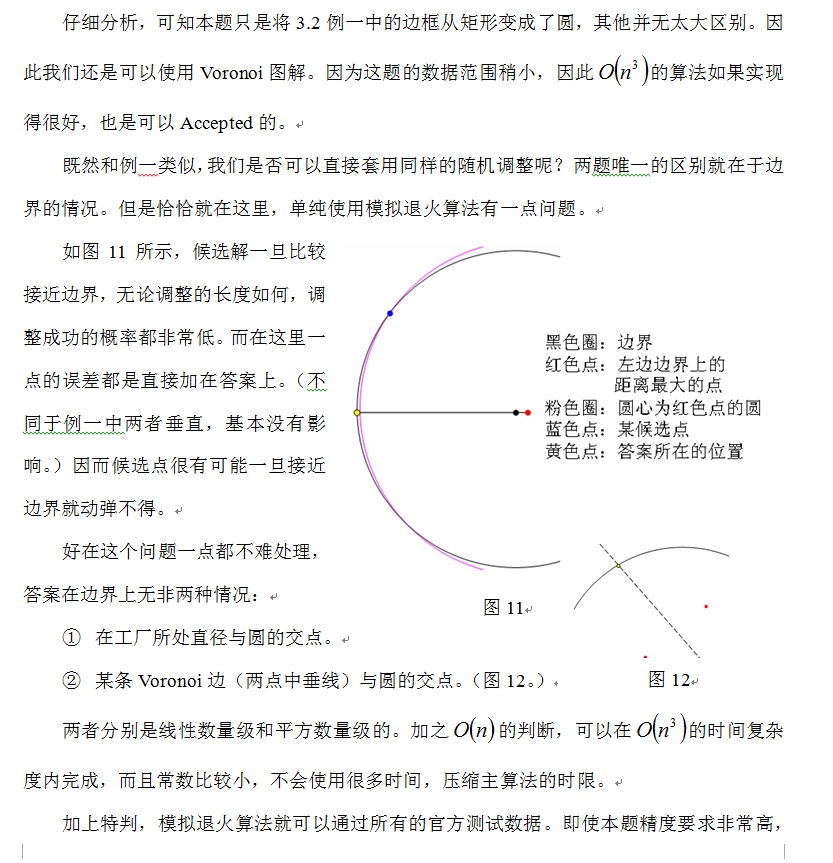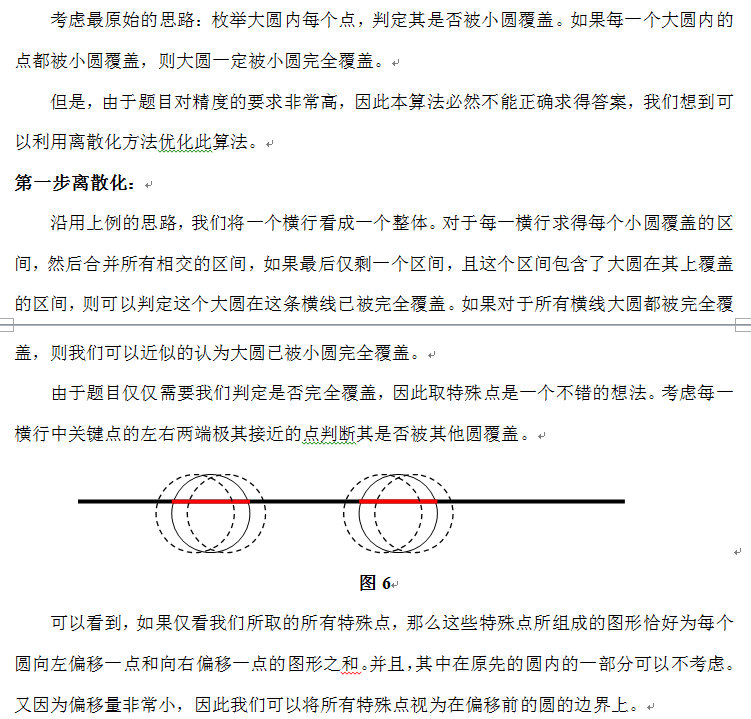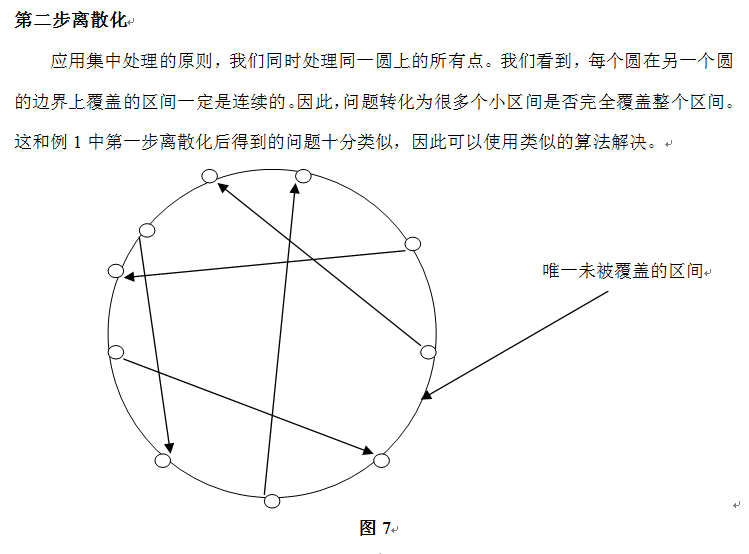与POJ 1379 Run Away差别不大
以下摘录特判
#include<cstdio>
#include<cstdlib>
#include<algorithm>
#include<cmath>
#include<ctime>
using namespace std;
const int N=1005;
const double eps=1e-5;
const double PI=acos(-1.0);
inline int dcmp(double a,double b){
if (fabs(a-b)<eps) return 0;
if (a>b) return 1; return -1;
}
inline double sqr(double x){ return x*x; }
inline double ran(double x){
return x*(rand()%10000)/10000;
}
inline double rnd(){
return 1.0*(rand()%10000)/10000;
}
struct Point{
double x,y;
Point(double x=0,double y=0):x(x),y(y) { }
void read(){ scanf("%lf%lf",&x,&y); }
double len(){ return sqrt(x*x+y*y); }
bool operator < (const Point &B) const { return x==B.x?y<B.y:x<B.x; }
friend Point operator - (Point A,Point B){ return Point(A.x-B.x,A.y-B.y); }
friend double Dis(Point A,Point B){ return (A-B).len(); }
}P[N];
double R; int n;
double Ans;
inline double F(Point p){
double ret=1e130;
for (int i=1;i<=n;i++)
ret=min(ret,Dis(p,P[i]));
return ret;
}
const double Eps=1e-8;
const double beta=.9;
const int Test=15;
inline double SA(){
Point sp,np; double theta;
double ans,ret;
theta=ran(2*PI);
sp=Point(sin(theta)*R,cos(theta)*R); ans=F(sp);
for (double T=R;T>Eps;T*=beta){
Point pre=sp;
for (int j=1;j<=30;j++){
theta=ran(2*PI);
np=Point(pre.x+sin(theta)*T,pre.y+cos(theta)*T);
if (np.len()>R) continue;
ret=F(np);
if (ret>ans)
sp=np,ans=ret;
}
}
return ans;
}
double best;
Point tp;
int main(){
Point tem;
freopen("t.in","r",stdin);
freopen("t.out","w",stdout);
srand(time(0));
scanf("%d%lf",&n,&R);
for (int i=1;i<=n;i++) P[i].read();
Ans=0;
for (int i=1;i<=n;i++)
if (P[i].len()>eps){
tem.x=P[i].x/P[i].len()*R;
tem.y=P[i].y/P[i].len()*R;
Ans=max(Ans,F(tem));
tem.x=-tem.x; tem.y=-tem.y;
Ans=max(Ans,F(tem));
}
for (int i=1;i<=n;i++)
for (int j=1;j<=n;j++)
if (!(!dcmp(P[i].x,P[j].x) && !dcmp(P[i].y,P[j].y))){
if (!dcmp(P[i].y,P[j].y)){
tem.x=(P[i].x+P[j].x)/2;
tem.y=sqrt(R*R-tem.x*tem.x);
Ans=max(Ans,F(tem));
tem.y=-tem.y;
Ans=max(Ans,F(tem));
}else{
double k=(P[i].x-P[j].x)/(P[j].y-P[i].y);
double b=(P[i].y+P[j].y)/2-k*(P[i].x+P[j].x)/2;
tem.x=(-2*k*b+sqrt(4*k*k*b*b-4*(k*k+1)*(b*b-R*R)))/(2*k*k+2);
tem.y=k*tem.x+b;
Ans=max(Ans,F(tem));
tem.x=(-2*k*b-sqrt(4*k*k*b*b-4*(k*k+1)*(b*b-R*R)))/(2*k*k+2);
tem.y=k*tem.x+b;
Ans=max(Ans,F(tem));
}
}
for (int t=1;t<=Test;t++)
Ans=max(Ans,SA());
printf("%.5lf\n",Ans);
return 0;
}
UPD 另一篇论文《圆的离散化》中讲了另一个方法
#include<cstdio>
#include<cstdlib>
#include<algorithm>
#include<cmath>
#include<cstring>
#define cl(x) memset(x,0,sizeof(x))
#define L first
#define R second
using namespace std;
typedef double ld;
typedef pair<ld,ld> abcd;
const int N=305;
inline ld sqr(ld x){ return x*x; }
const ld PI=acos(-1.0);
const ld eps=1e-10;
inline int dcmp(ld a,ld b){
if (fabs(a-b)<eps) return 0;
return a<b?-1:1;
}
inline ld K(ld x,ld y){
x+=eps;
if (x<0) return atan(y/x)+PI;
if (y<0) return atan(y/x)+PI*2;
return atan(y/x);
}
struct Circle{
ld x,y,r;
friend ld dist(Circle A,Circle B){
return sqrt(sqr(A.x-B.x)+sqr(A.y-B.y));
}
void read(){
double _x,_y; scanf("%lf%lf",&_x,&_y); x=_x,y=_y;
}
bool Cover(Circle B){
return dcmp(B.r+dist(*this,B),r)<=0;
}
}C[N];
int n; ld Ra;
int cover[N];
abcd S[N*N]; int cnt;
inline bool check(ld mid){
ld ix,iy,dd,tmp;
for (int i=1;i<=n;i++) C[i].r=mid;
for (int i=1;i<=n;i++){
cnt=0;
for (int j=1;j<=n && !cover[i];j++){
if (i==j || cover[j]) continue;
if (C[j].Cover(C[i])) { cover[i]=1; continue; }
if (C[i].Cover(C[j])) continue;
if (dcmp(dd=dist(C[i],C[j]),C[i].r+C[j].r)<0){
++cnt;
tmp=K(C[j].x-C[i].x,C[j].y-C[i].y);
ix=(sqr(C[i].r)-sqr(C[j].r)+sqr(dd))/2/dd;
iy=sqrt(sqr(C[i].r)-ix*ix);
S[cnt].L=tmp-K(ix,iy);
S[cnt].R=tmp+K(ix,iy);
if (S[cnt].L<0) S[cnt].L+=2*PI,S[cnt].R+=2*PI;
}
}
if (!C[0].Cover(C[i])){
int j=0;
++cnt; dd=dist(C[i],C[j]);
tmp=K(C[j].x-C[i].x,C[j].y-C[i].y);
ix=(sqr(C[i].r)-sqr(C[j].r)+sqr(dd))/2/dd;
iy=sqrt(sqr(C[i].r)-ix*ix);
S[cnt].L=tmp-K(ix,iy);
S[cnt].R=tmp+K(ix,iy);
if (S[cnt].L<0) S[cnt].L+=2*PI,S[cnt].R+=2*PI;
S[cnt].R-=2*PI; swap(S[cnt].L,S[cnt].R);
if (S[cnt].L<0) S[cnt].L+=2*PI,S[cnt].R+=2*PI;
}
if (cover[i]) continue;
sort(S+1,S+cnt+1);
int r=0;
for (int j=1;j<=cnt;j++)
if (r==0 || dcmp(S[j].L,S[r].R)>0)
S[++r]=S[j];
else if (dcmp(S[r].R,S[j].R)<0)
S[r].R=S[j].R;
int flag=1;
for (int i=1;i<=r && flag;i++)
if (dcmp(S[i].R-S[i].L,2*PI)>=0)
flag=0;
if (flag) return 0;
}
cl(cover);
return 1;
}
int main(){
freopen("t.in","r",stdin);
freopen("t.out","w",stdout);
scanf("%d%lf",&n,&Ra);
C[0].r=Ra;
for (int i=1;i<=n;i++) C[i].read();
ld iL=0,iR=2*Ra,MID;
while (iR-iL>1e-6)
if (check(MID=(iL+iR)/2))
iR=MID;
else
iL=MID;
printf("%.5lf\n",(double)iR);
return 0;
}

























 3321
3321

 被折叠的 条评论
为什么被折叠?
被折叠的 条评论
为什么被折叠?








